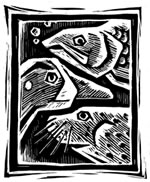- Home
- Restoration Projects
- Project Search
- HRM Program: Intensive surveys of juvenile herring 12120111-G
Project Information
Title: HRM Program: Intensive surveys of juvenile herring 12120111-G
Project Year and Number: 2012: 12120111-G
Other Fiscal Years and Numbers for this Project: 2015: 15120111-G, 2014: 14120111-G, 2013: 13120111-G
Principal Investigator (PI): Michele Buckhorn (Prince William Sound Science Center)
Managing Agency: NOAA
Assisting Personnel: Dick Thorne
Project Website: https://pwssc.org/juvenile-herring-abundance-in-prince-william-sound/
Research Location: Prince William Sound
Restoration Category: Monitoring
Injured Resources Addressed: Pacific Herring
Abstract:Hydroacoustic surveys of juvenile herring nursery areas in Prince William Sound have been conducted during fall and late-winter for the last several years. The number of locations surveyed have varied from 5-9, including the 4 Sound Ecosystem Assessment (SEA) bays. However, each seasonal effort has conducted only a single night survey in each of these locations. Thorne (2010) examined seasonal changes from fall 2006 to spring 2009. He showed that apparent overwinter mortality of age 0 herring appeared to be greatest in Simpson Bay and least in Whale Bay. However, the differences in seasonal abundance could be attributed to mortality, emigration, or changes in ambient light. We propose to address these uncertainties with an intensive fall and late winter/spring intensive survey. The fall series will start mid-October 2014 and extend to the first week of December. The late winter/spring series will begin the 3rd week of February 2015, and extend into the 2nd week of April. We propose to conduct the surveys in two bays sufficiently adjacent to cover each bay each night, such as Simpson Bay, Port Gravina, Windy Bay or St. Mathews Bay. In addition to the hydroacoustic surveys, we propose a single night of direct capture effort in each location for each of the survey weeks (See Bishop, this proposal). The survey design will follow the historic zig zag transects run by Thorne since 1993 in order to remain consistent with that sampling design and to put the long term fall and spring surveys into context.
Proposal: View (46 KB)
Reports:
Annual Report FY12: View (1,112 KB)
Final Report: See Project 15120111-G
Publications from this Project: None Available
